Book contents
- Frontmatter
- Contents
- List of Maps, Figures & Tables
- List of Photographs
- Abbreviations
- Contributors
- Acknowledgements
- Introduction Custodians of the Land: Ecology & Culture in the History of Tanzania
- Part One Environmental & Demographic Change
- Part Two Environmental Change & Economic History: In Tanzania's Northern Highlands
- Part Three Politics & Environmental Change
- Part Four Environment & Morality
- Seven Environment, Community & History: ‘Nature in the Mind’ In Nineteenth- and Early Twentieth-Century Buha, Western Tanzania
- Eight Canoe-Building Under Colonialism: Forestry & Food Policies in the Inner Kilombero Valley 1920-40
- Nine Struggles for the Land: The Political & Moral Economies of Land on Mount meru
- Conclusion
- Bibliography
- Index
Seven - Environment, Community & History: ‘Nature in the Mind’ In Nineteenth- and Early Twentieth-Century Buha, Western Tanzania
from Part Four - Environment & Morality
Published online by Cambridge University Press: 30 August 2017
- Frontmatter
- Contents
- List of Maps, Figures & Tables
- List of Photographs
- Abbreviations
- Contributors
- Acknowledgements
- Introduction Custodians of the Land: Ecology & Culture in the History of Tanzania
- Part One Environmental & Demographic Change
- Part Two Environmental Change & Economic History: In Tanzania's Northern Highlands
- Part Three Politics & Environmental Change
- Part Four Environment & Morality
- Seven Environment, Community & History: ‘Nature in the Mind’ In Nineteenth- and Early Twentieth-Century Buha, Western Tanzania
- Eight Canoe-Building Under Colonialism: Forestry & Food Policies in the Inner Kilombero Valley 1920-40
- Nine Struggles for the Land: The Political & Moral Economies of Land on Mount meru
- Conclusion
- Bibliography
- Index
Summary
At twilight after a bustling market day in the western Tanzanian town of Kasulu, an elderly woman sagging under a cluster of ibitoke beerbananas approaches the Bogwe River. She takes a deep breath, pulls her kitenge cloth closer to her chest and then pushes her foot into the swirling stream, eyes set firmly on the opposite shore. Carefully she treads, one bare foot before the other, her gaze never breaking from the distant shoreline, never looking down. All of her life she has lived together with the Bogwe, but in deep mistrust. She has known the river, infested as it is with nature spirits, to be a capricious neighbour.
The history of this uneasy coexistence between a woman and a river - her distrust of the river, her fear of its spirits, her reluctance to approach it and the defensiveness of her traverse - is ecological history. Ecological history, the study of the ever-changing relationship of human groups to their physical environment, not only addresses the physical and material, but also deals with the conceptual. The knowledge system that people use to define and interact with their environment is an important component of ecological history, since this knowledge has a direct bearing on their techniques for managing, changing and adapting to the environment.
This chapter deals with ecological history in the Buha cultural region of western Tanzania. It examines the relationship between Ha communities and their physical environment in the late nineteenth and early twentieth centuries. By linking this relationship to its changing historical context, and by demonstrating how the conceptualization of it changed as well, the chapter seeks to establish the historical character of * nature in the mind', or conceptual ecology. In doing so, it seeks to contribute to the growing body of knowledge comprising Tanzanian intellectual history.
Like many bodies of specialized knowledge, the Ha have left the deeper inner workings and crucial interstices of the ecological-spiritual framework to experts. The ecological knowledge of the layperson is in many cases limited to what is ‘obvious’ - that is, what is obvious from a Ha point of view - without penetrating the deeper levels of how and why. Those deeper and more nuanced aspects of the basic formulation remain privileged information. They are left to the experts - the bateko or earth priests, and to the banyamulagula ‘diviners’ and bapfumu, the specialists of human dysfunctions.
- Type
- Chapter
- Information
- Custodians of the LandEcology and Culture in the History of Tanzania, pp. 175 - 199Publisher: Boydell & BrewerPrint publication year: 1996



